- Home
- Richard Adams
The Plague Dogs: A Novel Page 2
The Plague Dogs: A Novel Read online
Page 2
Together they pulled on the crook, raised the heavy, pelt-sodden body head-first, broke the surface tension with a concerted heave and laid the inert dog on a foam-rubber mattress beside the tank. Here it resembled an enormous, drowned fly—very black, with a compressed shape something like that of a raindrop; and smaller than life, on account of a kind of collapse of the limbs and other excrescences into the central mass of the trunk. Mr. Powell began resuscitation; and after a little the dog vomited water and commenced to gasp, though its eyes remained closed.
“Right, that’ll do,” said Dr. Boycott briskly. “Now the usual tests, please, Stephen—pulse, blood sample, body temperature, reflexes—the various things we’ve been working on—and then plot the graphs. I’ll be back in about twenty minutes. I’m just going over to the Christiaan Barnard block to learn what I can about this afternoon’s brain surgery work. And please don’t smoke while I’m gone,” he added, mildly but firmly. “You’ll appreciate that that could have an effect on results.”
“All right to put its muzzle on, chief?” asked Mr. Powell. “Only this one, seven-three-two, ’s been known to be a right sod at times and it might come round enough to start in on me—sudden-like, you know.”
“Yes, there’s no objection to that,” replied Dr. Boycott, picking up the stop-watch.
“And the time, chief?” enquired Mr. Powell in a rather sycophantic tone, as though the time were likely to be something to Dr. Boycott’s personal credit.
“Two hours, twenty minutes, fifty-three and two fifths seconds,” answered Dr. Boycott. “Without looking at the papers, I think that’s about six and a half minutes longer than Wednesday’s test and about twelve minutes longer than the test before that. It’s rather remarkable how regular the increase appears to be. At this rate the graph will work out as a straight incline, although obviously we must reach a diminution somewhere. There must come a point where the additional endurance induced by the dog’s expectation of removal is counterbalanced by the limits of its physical capacity.”
He paused for a moment and then said, “Now, there’s another thing I’d like you to see to, please. I forgot to mention it this morning, but Cambridge are anxious for us to go ahead at once with the social deprivation experiment. We have a monkey set aside for that, haven’t we?”
“Yeah, I’m pretty certain we have,” replied Mr. Powell.
“I thought you told me we definitely had?” Dr. Boycott’s voice was a shade sharper.
“Yes, that’s right,” said Mr. Powell hastily. “We have.”
“Good. Well, it can go into the cylinder this evening. Now you’re sure that that cylinder excludes all light?”
“Yep. No light, restricted movement, adequate ventilation, wire mesh floor, faeces and urine fall through. It’s all checked.”
“Right, well, start it off, keep it under twice daily observation and, of course, mark the particulars up in a log. The total number of days should be kept up to date day by day, on a slate beside the cylinder. That’s a matter of courtesy to the Director. He’ll probably want to see it.”
“Where’s it to be kept, chief?” asked Mr. Powell.
“It doesn’t matter, as long as it’s somewhere where you can readily keep an eye on it,” answered Dr. Boycott. “I suggest, near where you normally work, as long as it’s not anywhere near any other animals. There should be silence, as far as possible, and no organic smells, of course. That’s part of the deprivation, you understand.”
“How about the balance-cupboard in Lab. 4, chief?” asked Mr. Powell. “Plenty of space in there at the moment and quiet as the grave.”
“Yes, that’ll do,” said Dr. Boycott. “Don’t forget to tell Tyson about feeding, and keep me informed how it goes on. We’ll aim at—well, say—er—forty-five days.”
“Is that the lot, chief?”
“Yes,” said Dr. Boycott, with his hand on the door. “But since it seems necessary to mention it, you’d better see that this tank’s cleaned out. There’s silt on the bottom which shouldn’t be there.”
It was only after a considerable administrative and political battle that the site for Animal Research, Surgical and Experimental (A.R.S.E.), had been approved at Lawson Park, a former fell farm on the east side of Coniston Water. As a Departmental project the scheme had, of course, attracted deemed planning permission, but following Circular 100 consultation both the County Council and the Lakeland National Park Planning Board had objected to it so strongly that the responsible Under Secretary at the Department of the Environment (having, no doubt, a vivid mental picture of himself in the chair at any confrontation discussions that might be arranged to try to resolve the matter in Whitehall) had taken very little time to decide that in all the circumstances a public local inquiry would be the most appropriate course. The inquiry had lasted for two weeks and at various times during the proceedings the Inspector (who in his private hours indulged a taste for seventeenth-century English history) had found himself wishing that, like that Mr. Bradshaw who presided at the so-called trial of King Charles I, he had been provided with a bullet-proof hat. The deputy county clerk had cross-examined the Ministry experts with brilliant penetration on the precise extent of the urgency and need to site yet another Government project in a national park. The Secretary of the Countryside Commission, subpoenaed by the Planning Board, had been virtually compelled to give evidence against the Department into which he was hoping to be promoted to Under Secretary. The Council for the Protection of Rural England had greatly assisted the case in favour of the project by testifying with passionate emotion that nobody ought to be allowed to build anything anywhere any more. A Mr. Finward, a retired merchant naval officer, who occupied a cottage on the fell not far from the site, had threatened the Inspector with bodily injury unless he undertook to report against the proposal. And a Mr. Prancebody, who testified amongst other things that he had discovered the truth of the British Israelite theory while exploring the Derbyshire caves, had read in evidence most of a sixty-three-page submission, before the long-suffering Inspector had ruled it to be irrelevant and inadmissible and Mr. Prancebody, violently objecting, had been somewhat eponymously removed by the police. There was, in fact, scarcely a dull moment throughout the proceedings. Of particular interest had been the evidence of the R.S.P.C.A., who were emphatic that they favoured the scheme, on the grounds that the experiments and surgery would redound to the benefit of animals in general.
After the inquiry the Inspector, pressed by the Deputy Secretary of the Department to complete his publishable report as quickly as possible (regardless of whatever length of time he might need to make a good job of it), had recommended against planning approval for the site at Lawson Park and consequently against the compulsory purchase order on the property. The Secretary of State, the Right Hon. William Harbottle (known to his Departmental civil servants as “Hot Bottle Bill” on account of his chronically cold feet), had succeeded in getting the matter up to Cabinet Committee, following which a decision to approve against the Inspector’s recommendation had been traded with the Home Secretary and the Minister of Labour, sub rosa, for agreement to a new open prison in Worcestershire, the head of the Chief Alkali Inspector on a charger and the tail of a young lady named Miss Mandy Pryce-Morgan, who was currently dispensing her favours to certain of the Front Bench.
Coniston Old Man
Upon the announcement of the Secretary of State’s decision, public reaction had been generally adverse. Under fire, Hot Bottle Bill had stood his ground like a good ’un, manfully ensuring that the Parliamentary attacks were invariably answered by one of his junior colleagues, Mr. Basil Forbes (otherwise known as Errol the Peril, on account of his unpredictable imprudence). Eventually brought to bay by Mr. Bernard Bugwash, Q.C., the Member for Lakeland Central, he had, on the night, brilliantly contrived to be unavoidably absent and Errol the Peril had spoken for six minutes flat. The next morning a much better stick with which to beat the Government had appeared in the form of the report of t
he Sablon Committee, which recommended that more public money ought to be spent on medical research. Since the Government, keen to reduce public expenditure, were reluctant to accept this recommendation, the Opposition had naturally supported it: and since support for Sablon was virtually incompatible with any further attack on the Lawson Park decision, it was generally conceded that Hot Bottle Bill had contrived to survive yet another cliff-hanging instalment of his career. Lawson Park passed into Government hands; and the celebrated firm of architects, Sir Conham Goode, Son and Howe, were commissioned to design the buildings.
It was generally agreed that these blended very well into their surroundings—the open hillside and oak copses, the darker patches of pine and larch, the dry stone walls, small green fields and knife-bright, cloud-reflecting lake below. Sir Conham had retained the old farmhouse and outbuildings, converting them into a luncheon room, common room and offices for the resident staff. Local stone and slate had been used to face and roof the laboratories, the Christiaan Barnard surgical wing and the stables, while for the livestock block Lord Plynlimmon, the well-known photographer and aviary expert, had been co-opted to design a single, large building, comprising under one roof more than twenty various sheds and rooms equipped with cages. The establishment had been opened on midsummer day, in pouring Lakeland rain, by Baroness Hilary Blunt, the former all-time high in Permanent Secretaries, and the flow of letters to The Times had trickled, faltered and finally ceased.
“And now,” said the newly appointed Director to Dr. Boycott, as the first consignments of dogs, guinea-pigs, rats and rabbits came rolling up the smooth, steeply gradiented tarmac in the station’s three distinctively painted blue vans, “now let’s hope we’ll be left in peace to get on with some useful work. There’s been a lot too much emotion spent on this place so far, and not enough scientific detachment.”
The black mongrel, its coat almost dried, the muzzle removed and a flexible rubber oxygen pipe fixed close to its half-open mouth, was lying on a pile of straw in one corner of a wire pen at the far end of the canine shed. A label on the pen door bore the same number—732—as that stamped on the dog’s green plastic collar, while below this was typed: SURVIVAL EXPECTATION CONDITIONING: (WATER IMMERSION): DR. J. R. BOYCOTT.
The shed comprised, in all, forty pens, arranged in two double rows. Most of these contained dogs, though one or two were empty. With the majority of the pens, all four sides consisted of stout wire netting, so that for the occupants of these there were three party walls and three canine neighbours, except where an adjacent cage happened to be empty. The pen of seven-three-two, however, being at the end of Row 4 and also at the end of the block, had one brick wall, which was, in fact, part of the periphery wall of the building itself. Since the adjacent pen in Row 4 happened to be empty, seven-three-two had only one neighbour—the dog in the back-to-back cage in Row 3, also situated against the brick wall. This dog was not at the moment to be seen, and was evidently in its kennel (for each pen contained a kennel), though there were signs of occupation—a well-gnawed rubber ball in one corner, a yellowing blade-bone with no meat remaining on it, several fresh scratches along the brickwork, some ordure, a half-empty water-bowl and, of course, a label on the door: 815. BRAIN SURGERY, GROUP D. MR. S. W. C. FORTESCUE.
Over the whole interior of the shed lay a pervading smell of dog, together with the sharp smells of clean straw and of concrete brushed down with water and Jeyes fluid. Through the high-placed, bottom-hung hoppers, however, most of which were open, other smells came blowing, borne on a fresh wind—bracken and bog myrtle, sheep shit and cow dung, oak leaves, nettles and the lake at damp nightfall. The evening was growing dark and the few electric bulbs—one at each end of each row—seemed, as the twilight deepened, less to take the place of the declining day than to form isolated patches of yellow light, too hard to be melted by the gentle dusk, from which the nearest dogs turned their eyes away. It was surprisingly silent in the block. Here and there a dog scuffled in its straw. One, a brown retriever with a great scar across its throat, whined from time to time in sleep, while a mongrel whippet with three legs and a bandaged stump stumbled clumsily round and against the sides of its pen with a soft, wiry sound not unlike that produced by a jazz drummer with brushes. No dog, however, of the thirty-seven in the block, seemed lively enough or sufficiently disturbed or stimulated to give tongue, so that the quiet noises of evening flickered plainly in their ears, as sunlight twinkling through silver-birch leaves flickers back and forth in the eyes of a baby lying in its cot: the distant call of a shepherd, “Coom bye, coom bye ’ere!”; a passing cart down on the Coniston road; the lapping (just perceptible to dogs’ hearing) of the lake water on the stones; the tug of the wind in rough grass tussocks; and the quick, croaking “Go back, go back, go back” of a grouse somewhere in the heather.
After a while, when the October night had almost completely fallen outside, there came a sharp clawing and scratching of straw from inside the kennel of eight-one-five. This continued for some time, with a sound rather as though the occupant, whoever he might be, were trying to burrow through his kennel floor. Finally, indeed, there were distinct noises of gnawing and splintering, followed by several minutes’ silence. Then a smooth-haired, black-and-white head—the head of a fox terrier—emerged from the door of the kennel. The ears cocked, listening, the sniffing muzzle was raised for some moments, and finally the entire dog came out, shook itself, lapped a little water from its tin bowl, raised a leg against the brickwork, and then made its way across to the party wire separating it from the next pen.
The terrier certainly presented a strange appearance, for at first sight it seemed to be wearing a kind of black cap, causing it rather to resemble one of those animals in children’s comic papers which, while the draughtsman may have given it the head of a cat, dog, bear, mouse or what you will, nevertheless wears clothes and may even go so far as to possess inappropriate anatomical features (elbow-joints, for instance, or hands). Indeed, to the extent that a cap is a head-covering, it was wearing a black cap, though this was in actual function a surgical dressing made of stout oilskin and fastened securely to the head with cross-bands of sticking-plaster in such a way as to prevent the dog from scratching and worrying at the antiseptic lint beneath. The whole appliance, lozenge-shaped, was tilted rakishly over the right eye, so that the terrier, in order to see straight in front, was obliged to incline its head to the right—a mannerism which gave it a rather knowing look. Having reached the wire, it rubbed one ear against it as though to try to loosen the dressing, but almost at once desisted, wincing, and crouched down close to where the large, black dog was lying on the other side.
“Rowf?” said the terrier. “Rowf? They’ve taken away all the rhododendrons and just left the maggots. O spin like a ball, isn’t it dark? There’s just this one star shining down my throat, that’s all. You know, my master—”
The black dog sprang to its feet, and as it did so the flow of oxygen from the pipe cut out automatically. Teeth bared, eyes glaring, ears laid flat, it backed against its kennel, crouching into the straw and barking as though beset on every side.
“Rowf! Rowf! Grrrrrr-owf!”
As it barked, its head turned quickly this way and that, seeking an assailant.
“Grrrrr-owf! Rowf! Rowf!”
All over the block other dogs took up their cues.
“I’d fight you all right, if I could only get at you!”
“Why don’t you shut up?”
“D’you think you’re the only one who hates this damned place?”
“Why can’t we have some peace?”
“Ow! Oow! That’s the damned dog that wants to be a wolf!”
“Rowf!” said the terrier quickly. “Rowf, lie down before the lorry comes—I mean, before the leaves catch fire! I’m falling as fast as I can. Be quiet and I’ll reach you.”
Rowf barked once more, stared frenziedly round, then slowly lowered his head, came up to the wire and began to sniff at the other’
s black nose pressed between the mesh. A few moments more and he lay down, rubbing his big, rough-coated head backwards and forwards against one of the stanchions. Gradually the hubbub in the draughty block subsided.
“You smell of the metal water,” said the terrier. “You’ve been in the metal water again, so I tell, so I smell, well well.”
There was a long pause. At last Rowf said, “The water.”
“You smell like the water in my drinking-bowl. Is it like that? The bottom’s dirty, anyway. I can smell that, even if my head is done up in chicken-wire.”
“What?”
“My head’s done up in chicken-wire, I said. The whitecoats fastened it all round.”
“When did they? I can’t see it.”
“Oh, no,” replied the terrier, as though brushing aside some quite unreasonable objection, “of course you can’t see it!”
“The water,” said Rowf again.
“How did you get out? Do you drink it or does the sun dry it up or what?”
“I can’t remember,” answered Rowf. “Get out—” He dropped his head into the straw and began biting and licking at the pad of one fore-foot. After some time he said, “Get out—I never remember getting out. They must pull me out, I suppose. Why can’t you let me alone, Snitter?”
“Perhaps you’re not out at all. You’re drowned. We’re dead. We haven’t been born. There’s a mouse—a mouse that sings—I’m bitten to the brains and it never stops raining—not in this eye anyway.”
Rowf snarled at him. “Snitter, you’re mad! Of course I’m alive! Leave your face there if you don’t believe me—”
Snitter jerked his head back just in time.
“Yes, I’m mad, sure as a lorry, I’m terribly sorry. The road—where it happened—the road was black and white—that’s me, you know—”
He stopped as Rowf rolled over in the straw and lay once more as though exhausted.

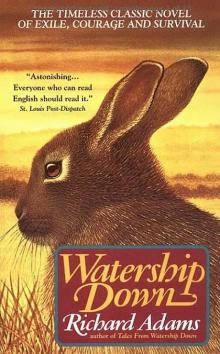 Watership Down
Watership Down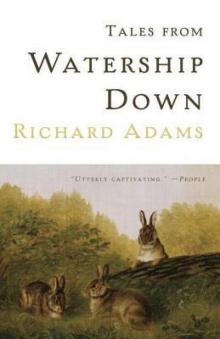 Tales From Watership Down
Tales From Watership Down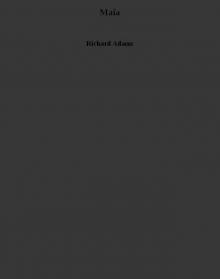 Maia
Maia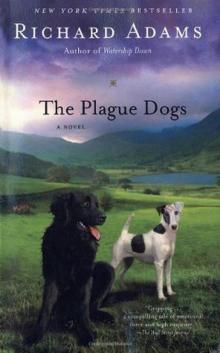 The Plague Dogs
The Plague Dogs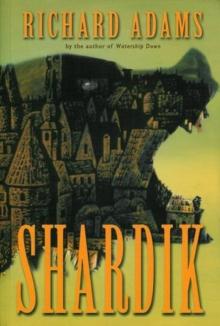 Shardik
Shardik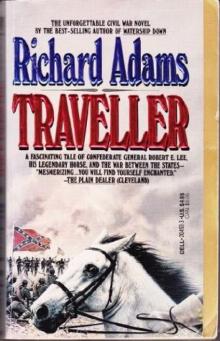 Traveller
Traveller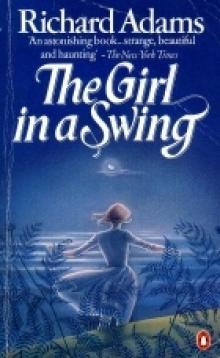 The Girl in a Swing
The Girl in a Swing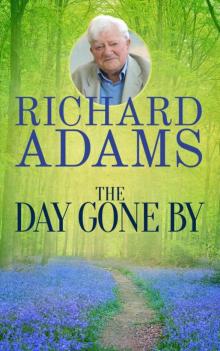 The Day Gone By
The Day Gone By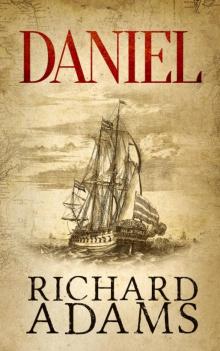 Daniel
Daniel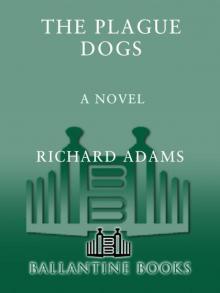 The Plague Dogs: A Novel
The Plague Dogs: A Novel